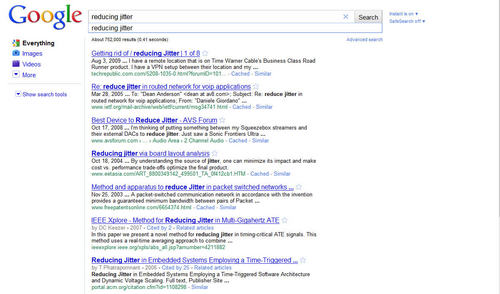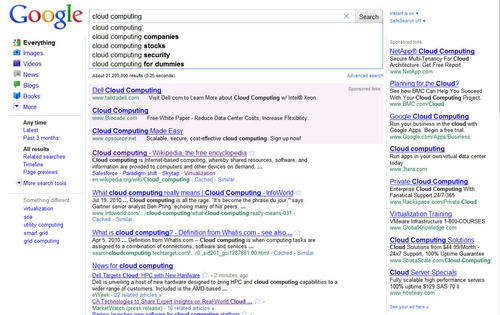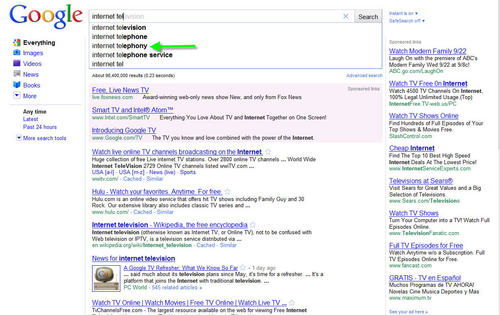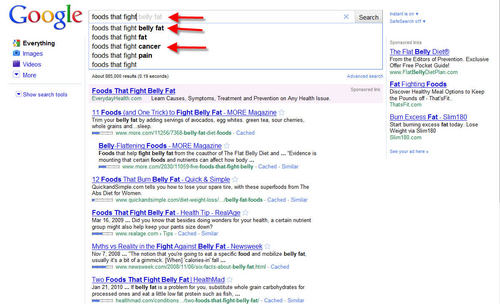There has been much back and forth over the release of Google Instant, a new service which shows search results based on what you type and before you are finished. Common wisdom tells us this improvement will allow Google to gain more marketshare because users will find what they want more quickly but having used the service casually for part of the day I am trying to wrap my head around the improvement and if it will indeed help us find virtual needles in haystacks more efficiently.
Now as a hunt-and-peck typist I must admit it is challenging for me to type while looking at the keyboard and also take advantage of seeing results as they appear almost-immediately onscreen. My eyes do gravitate however towards the suggestion box which is not a new feature.
For a short tailed search which consists of a word or two it seems this new feature is not very helpful. You can see some examples below.
In the first case below the search term “reducing jitter” didn’t even have any suggestions for me.
So then I tried tying in “cloud computing directory” and before I finished I noticed the term “cloud computing companies” was an appropriate suggestion I could click on
A search for “internet telephony” gave me options which weren’t helpful at all
This is where things get confusing. Some people have opined that this move makes SEO irrelevant and I can’t wrap my head around how this is the case. SEO and SEM are a multibillion dollar industry and if it has been wiped out, we will soon see even larger lines at the soup kitchens.
Thankfully I just don’t share the pessimism. In my repeated searches I couldn’t get over how annoying the new feature was to me as I focused on the keyboard and the various parts of the screen at once.
I spent some time with my editorial team to gauge their thoughts. Patrick Barnard, Group Managing Editor, TMCnet doesn’t see Google Instant as useful:
As a “non-touch” typist Google Instant is of little consequence to me – I don’t see the results until I’m done typing because I’m looking at the keyboard.
Furthermore the results that come up for “half of a typed term” don’t mean much to me either – the end result for the full term is all that matters (furthermore it is all that I would instinctively trust – why would I trust the results I get for half of a typed term?).
What is of consequence is the results I get. As a journalist, 90 percent of the time when I’m searching I’m using generic terms – so I’m looking for objective, unbiased and most importantly “non-branded” results to come to the top of the page. The more branded information I get in my search results, the more likely I am to consider using another search engine that presents unbiased results at the top of the page.
I then decided to ask TMCnet Web Editor Juliana Kenny what she thought to get the perspective of someone who doesn’t have to look at the keyboard when typing and she didn’t seem too impressed either:
As a touch typist, I find that the Google Instant application could be helpful depending on what I’m searching. I was pleased to see that an image of ‘Lady Gaga’s meat dress’ popped up half way through my search using those exact terms, but I did have to type the full “Sea Hag IPA” in order to get results from the New England Brewing Company. But I also find the constantly refreshing search distracting as I type into the search field. The function requires me to type more slowly in order to view the results properly which probably negates the 2-5 seconds I’ll save using Google Instant:
Overall, I will probably be typing in the full search phrase regardless of instant results so I can be sure to obtain the most authentic search result.
Google tells us that “certain keywords [will] receive significantly more or fewer impressions moving forward” and the reason for this is simple. In my example above where I was looking for “cloud computing directory” I might opt instead for the suggested “cloud computing companies.”
As a result, popular search terms have the potential now to be even more popular and unpopular terms will likely be less popular
So the winners online today will be bigger winners as a result and the losers will likely be in the web traffic poorhouse.
Gary Kim, TMCnet Contributing Editor adds to the discussion by saying that advertisers may see their page views increase as a result of this change and their click percentages will likely decrease. I can’t agree more with him.
The other big winner here is without a doubt Google as I expect there will be a number of people who are enticed by seeing the results of suggested searches in real-time. We have all experienced impulse purchasing power at the grocery store cashier. Seeing gum makes you want to own it and chew it. Likewise seeing search suggestions and the results will make more people interested in exploring search alternatives while researching. Google will see more traffic but not because individual searches will be more effective.
As an example when I did a sample search on “foods that fight cancer” I was presented with a suggestion and full results for “foods that fight belly fat.” Seeing the results make me more likely to get sidetracked and explore the belly fat choices before getting back to the cancer results I originally sought.
One has to imagine the “impulse effect” is good for 5-15% more search time per user as some undisciplined searchers will end up in nested loops of sidetracked research.
And the timing couldn’t be better as Facebook just passed Google for the title of time spent on site and this new feature may possibly help Google regain its title.
Some have opined that Microsoft is the big loser here and I tend to agree – not because Google will be seen as having even better search than Bing but instead because Google users will spend more time on the world’s already most-popular search engine.
I’ll close with a prediction. We’ll read an article from a highly ranked site like TechCrunch or others in the next few weeks which points to the fact that some users are switching to Bing to avoid the distraction of new Google Instant and Google will respond in short order by publicizing how users can turn the new feature off if they so choose.






Alan Mitchell
September 10, 2010 at 3:34 amInteresting point about the distinction between touch typists and non-touch typists. I guess the effect of Google Instant on searcher behaviour will depend on the patience of which people are willing to wait for results to refresh one word at a time.
I recently wrote an article exploring the behavioural implications of Google Instant ( http://www.alanmitchell.com.au/discussion/the-laziness-of-google-instant/ ), and argue that people may learn to limit the extent of their searches to Autocomplete suggestions.
If this is the case, searches would largely be limited to the comprehensiveness of Google’s search suggestions, which could have massive implications for SEO and PPC.
CRMStategist
September 10, 2010 at 7:09 amBeyond the hype that Google always receives when they launch a new product this is little more that autocomplete with a bit of ‘i feel lucky’ mixed in, it is an interesting step towards the semantic web but do we want Google trying to predict our searches? It’s rarely got it right before.
Paul
September 10, 2010 at 7:34 amTwo observations/speculations:
1.) This could be a way for Google to collect even more sophisticated behavioral user data. Just like our individual search results appear in different order, based on our past clicks on Google, the same may be true for this.
2.) The feature is less about attracting new users or new searches, but merely organically and incrementally improving a couple of best practices. If a feature like this improves click-through by 1/1000 of 1%, there’s still a significant upside to Google given their scale.
Implications/Questions:
A.) How will this work on mobile devices?
B.) Will similar functionality be integrated into mobile unified communications systems?
C.) Will this simply go away after a short time and be a technology footnote in history? About Me – http://bit.ly/c4BJLX
Related Articles
Why Teaching STEM to Inner-City Kids is Like Fracking For Untapped Potential
How Beep Takes the Slow, Steady and Potentially Safer Approach to Autonomous Vehicles
Why Companies Should Run a SPAC Process Now